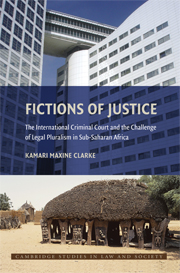 Fictions of Justice
Fictions of Justice Published online by Cambridge University Press: 23 January 2010
“Eine Idee deren Zeit gekommen ist [This is an idea whose time has come]!” exclaimed Mr. Heimler, a diplomatic host at the New York City–based German Mission to the United Nations (UN). He had taken his place at the speaker's platform to express appreciation for the establishment of the International Criminal Court (ICC) – the first permanent international tribunal with the jurisdiction to try those who commit the worst crimes against humanity. With a room full of people from various countries, and with characteristic diplomatic resilience, he explained, “Today, July 1, 2002, the ICC has come into force as the first permanent international court responsible for adjudicating crimes against humanity, war crimes, genocide, and, when defined, the crime of aggression.” He continued, “As you know, this was no small feat. Today the ICC stands as an expression of the will of two-thirds of the world's nations, representing the shared dream of universal personhood.”
After establishing the profundity of the moment – the achievement of legal precepts emanating from an international text holier in its supranational institution because it was seen as being untouched by the tainted hands of potentially corrupt governments – the German diplomat began welcoming ministers of ambassadorial offices from around the world. He acknowledged a range of diplomatic staff, legal advisors, political analysts, representatives from nongovernmental organizations (NGOs), and guests, then invited us all to share with him the satisfaction of witnessing the realization of two visions of international justice: an institutional dream and a moral dream, both connected to achieving individual freedom for all.
To save this book to your Kindle, first ensure [email protected] is added to your Approved Personal Document E-mail List under your Personal Document Settings on the Manage Your Content and Devices page of your Amazon account. Then enter the ‘name’ part of your Kindle email address below. Find out more about saving to your Kindle.
Note you can select to save to either the @free.kindle.com or @kindle.com variations. ‘@free.kindle.com’ emails are free but can only be saved to your device when it is connected to wi-fi. ‘@kindle.com’ emails can be delivered even when you are not connected to wi-fi, but note that service fees apply.
Find out more about the Kindle Personal Document Service.
To save content items to your account, please confirm that you agree to abide by our usage policies. If this is the first time you use this feature, you will be asked to authorise Cambridge Core to connect with your account. Find out more about saving content to Dropbox.
To save content items to your account, please confirm that you agree to abide by our usage policies. If this is the first time you use this feature, you will be asked to authorise Cambridge Core to connect with your account. Find out more about saving content to Google Drive.